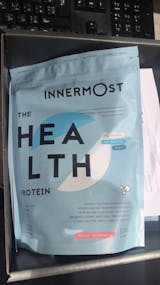Breathe in through your nose, out through your mouth. That’s what they say, right? Well, there’s been some research to suggest that nasal breathing during exercise is the new go-to, and there are some pretty impressive nasal breathing benefits, if we do say so ourselves.
Do you breathe through your mouth or nose? Think about it. Right now, how are you breathing?
Typically, for everyone it’s different, and this is generally the technique that is more comfortable for you. The fact is though, better oxygen intake means greater energy levels: which by the way, you can also get from The Energy Booster.
A lot of people ask us questions around breathing during exercise, such as how to breathe when jogging, sprinting and rowing. Well, here we go… nasal breathing is the new way to go.
What is nasal breathing?
It’s probably good to get this technique defined, so that you can start implementing the breathing exercise on your next run, or when you next pop to the gym. Nasal breathing involves slow, controlled, and deep breaths through your nose whilst exercising. The aim of the game here, is to breathe in deeply enough so that you fill your lungs with air. As much as possible, actually.
Not only does this breathing technique increase your oxygen intake, but the strategy slows down your breathing and heart rate, conserving energy. Thus, improving your athletic performance. Voila.
What is mouth breathing?
We’d say that the clue is in the name, but we thought we’d clear up the difference anyway. This is when you breathe through your mouth.
However, you may be surprised that mouth-breathing introduces some risks. So, if you’re a so-called “mouth-breather” (as horrible as that name is), it might be time to listen up and change your ways.
Chronic mouth breathing can lead to growth issues in children such as crooked teeth and facial deformities, and in adults, breathing solely through the mouth can cause bad breath, chronic fatigue, irritability and even snoring. Woah.
Nasal breathing benefits
- Nasal breathing engages the lower lungs
This means that you’re pumping out more oxygen, which travels around your body. This is great for your cells, which means healthy organ functioning, great cell growth and a happy body.
- Improves your diaphragm use
Breathing through the nose means that you are helping your diaphragm (the major muscle involved in respiration) to work properly and efficiently. Sounds pretty helpful.
- It increases your production of Nitric Oxide
Nitric oxide sounds pretty harmful, but it is a vasodilator. A vasodilator is used in the widening of blood vessels, and are often used in the treatment of high blood pressure. An introduced production of Nitric Oxide (NO) can improve your oxygen circulation, again improving organ and cell functioning.
- Filters out harmful allergens
The nose is carefully constructed to prevent foreign items, allergens and other nasties from entering our respiratory tract. This means that engaging in nasal breathing techniques (as opposed to breathing through our mouths), means that the number of harmful germs, foreign bodies and other unwanted items is greatly reduced. Thank goodness.
- Promotes smoother oxygen entry
This sounds pretty sophisticated, but what we mean by this is, breathing through your nose both warms-up and moistens the air you breathe in. This is particularly advantageous if you’re exercising in cold weather (as breathing in the cold is harder in itself, anyway), and means that the air we breathe in has more opportunity to warm up before reaching your lungs.
Warm air means greater dilation of the bronchial tubes. What does that mean for us? Yeah, better oxygen intake. You guessed it.
The science behind the nasal breathing technique
Now you may be thinking, that’s all well and good. But is there evidence to support this? Stop right there, we’re way ahead of you.
This advice hasn’t come from nowhere. It’s been found that nasal breathing actually stimulates the nervous system – more specifically, the area that prioritises rest and recovery, as well as digestion. This means that nasal breathing promotes relaxation, and a sense of calmness – one that is definitely welcomed when you’re mid 10k run, hoping that the next 5k go way faster than the last.
Research conducted by the International Journal of Kinesiology and Sports Science revealed that whilst this nasal breathing technique does not increase our ability to intake oxygen, nasal breathing techniques decrease respiratory rate, ratio of oxygen intake to carbon dioxide, and even breaths per minute.
The study involved both male and female runners and required the runners to use the nasal breathing technique for a period of six months. So, in our eyes, it’s a pretty well-rounded, balanced study, and definitely shows that there is scope to introduce this into your workout routine for improved athletic performance.
Techniques for breathing after exercise
Whilst we’ve covered the technique for breathing whilst jogging, skipping or whatever your exercise of choice is, we thought it would be helpful to give you some advice when it comes to warming down.
The thing to prioritise here is your posture. Sit upright, or lay down flat on the floor, to ensure your spine is as flat and straight as possible. Another way to do this – depending on where you’ve worked out, is to lie flat on the floor and place your legs at a 90-degree angle to the wall.
This gives you the ability to fill your lungs to full capacity, and promotes oxygen flow, recovery and enhances your oxygen levels. All essential for your post-exercise routine.
Summary
If you’re someone that exercises frequently, and you’ve noticed that you primarily breathe through your mouth – give this nasal breathing technique a go. Not only will you stop yourself becoming victim to the risks of mouth-breathing that we outlined above, but you’ll reap the benefits when it comes to your athletic performance, too.
























